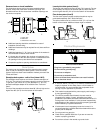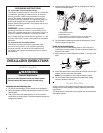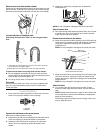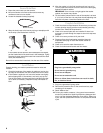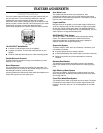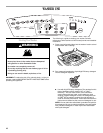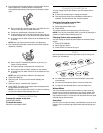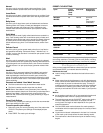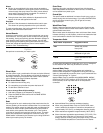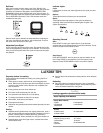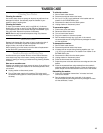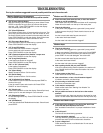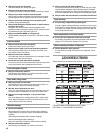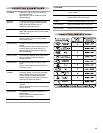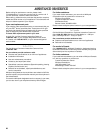
13
Rinses
■ Rinsing is accomplished in the same manner as washing.
Fresh water is added to a slow spinning load. Then the load
moves through the spray rinses. The water is then drained
away and the rinsing process is repeated. The number of
rinses varies depending on the cycle.
■ During the last rinse, fabric softener is dispensed into the
bottom of the tub and applied to the load.
Final Spin
■ The last of the rinse water is drained and the load is spun.
The amount of spinning depends on the cycle selected.
To make unloading easy, the load is peeled off the sides of the
basket by the CALYPSO
®
wash motion.
Normal Sounds
As with any new product, you will hear sounds that you are not
accustomed to. You may hear various sounds occurring during
the washing, rinsing and spinning process. Between changes in
wash actions, there will be momentary pauses. You will hear
water spraying and splashing during the wash and rinse cycles.
These new sounds and pauses are part of normal washer
operation. See “Troubleshooting.”
Options
Use options to customize your wash cycles.
Rinse & Spin
Use this option to get a combination of rinses and spins followed
by a high-speed spin. The time display will include an estimate of
how long it will take to fill and drain the washer. Fabric softener
can be added to the Fabric Softener dispenser.
When to use Rinse & Spin
■ For loads that need rinsing only.
■ For completing a cycle after the power has been off.
■ To add fabric softener to load.
To use or change Rinse & Spin settings:
1. Add fabric softener to the dispenser (if desired).
2. Press the RINSE & SPIN control until the RINSE & SPIN
indicator light glows.
3. Press START.
Soak
Use this option for set-in stains and soil that need extra time for
removal. Soaking in this washer is different than in a conventional
washer. The washer sprays the load with water and detergent for
4 minutes at extra low spin speed followed by a brief period of
wash action at the speed of the selected cycle. Then another
4 minutes of spraying and extra low spinning occurs. The wash
action then pauses for the detergent to work on the soils. The
SOAK feature is followed by the selected cycle. Using SOAK will
extend your wash cycle by 16 minutes.
Extra Rinse
Selecting this option provides a second rinse with the same
water temperature as selected for the first rinse. An Extra Rinse
can be added to any wash cycle.
Extend Spin
This option adds an additional 3 minutes of spin to any cycle to
reduce drying time and save energy. If you select EXTEND SPIN
and do not select a wash cycle, you will get an 8 minute,
high-speed spin.
Wash/Rinse Temp
Select a water temperature based on the type of load you are
washing. Use the warmest wash water safe for fabrics. Follow
garment label instructions.
Warm rinses leave the loads dryer than cold rinses. Warm rinses
increase wrinkling. In cold climates, a warm rinse makes the load
more comfortable to handle. Cold rinses save energy.
Temperature Guide
In wash water temperatures colder than 70°F (21°C), detergents
do not dissolve well. Soils may be difficult to remove.
Assured Water Temp
Assured Water Temp electronically senses and maintains a
uniform water temperature. It regulates incoming hot and cold
water. It is automatically turned On when a cycle is selected. See
“Preset Cycle Settings” in “Cycles.”
Assured Water Temp is available with WARM/WARM, WARM/
COLD and COLD/ COLD settings. HOT/COLD (top) and COLD/
COLD (bottom) are for tap water that is not temperature
controlled.
■ Assured Water Temp ensures consistent cleaning.
■ When using Assured Water Temp on COLD/COLD, warm
water is added to the washer to maintain a temperature of
approximately 75°F (24°C), so detergents dissolve properly.
■ Warm washes are regulated at approximately 100°F (38°C).
■ Warm rinses are regulated at approximately 75°F (24°C). This
is a cooler warm rinse than you are used to, but it saves
energy, reduces wrinkling, and gives proper rinsing. The load
is a comfortable temperature to remove from the washer.
Wash Water Temperature Suggested Fabrics
HOT Whites and pastels
Heavy soils
WARM Bright colors
Moderate to light soils
COLD Colors that bleed or fade
Light soils



